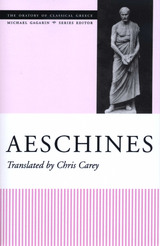
This is the third volume in the Oratory of Classical Greece series. Published over several years, the series presents all of the surviving speeches from the late fifth and fourth centuries B.C. in new translations prepared by classical scholars who are at the forefront of the discipline. These translations are especially designed for the needs and interests of today's undergraduates, Greekless scholars in other disciplines, and the general public.
Classical oratory is an invaluable resource for the study of ancient Greek life and culture. The speeches offer evidence on Greek moral views, social and economic conditions, political and social ideology, and other aspects of Athenian culture that have been largely ignored: women and family life, slavery, and religion, to name just a few.
This volume contains the three surviving speeches of Aeschines (390-? B.C.). His speeches all revolve around political developments in Athens during the second half of the fourth century B.C. and reflect the internal political rivalries in an Athens overshadowed by the growing power of Macedonia in the north. The first speech was delivered when Aeschines successfully prosecuted Timarchus, a political opponent, for having allegedly prostituted himself as a young man. The other two speeches were delivered in the context of Aeschines' long-running political feud with Demosthenes. As a group, the speeches provide important information on Athenian law and politics, Demosthenes and his career, sexuality and social history, and the historical rivalry between Athens and Macedonia.

An adversarial advocate.
Aeschines, orator and statesman of Athens, 390 or 389–314 BC, became active in politics about 350. In 348 he was a member of a mission sent to the Peloponnese to stir up feeling against the growing power of King Philip of Macedon; but in 347, when part of a peacemaking embassy to Philip, was won over to sympathy with the king, and became a supporter of the peace policy of the Athenian statesman Eubulus. On a second embassy in 346 to ratify a peace Aeschines’ delaying tactics caused the famous orator Demosthenes and Timarchus to accuse him of treason, a charge that he successfully rebutted in the strong extant speech Against Timarchus. In 344–343, when Demosthenes accused him again in a speech, Aeschines replied in the fine extant speech having the same title On the False Embassy and was again acquitted. In 336, when Ctesiphon proposed that Demosthenes should be awarded a crown of gold for state service, Aeschines accused him of proposing something that would violate existing laws. At the trial Aeschines’ extant speech Against Ctesiphon was answered by Demosthenes in his masterpiece On the Crown. Aeschines, discredited, left Athens and set up a school of rhetoric at Rhodes. He died in Samos.
As examples of Greek oratory the speeches of Aeschines rank next to those of Demosthenes, and are important documents for the study of Athenian diplomacy and inner politics.
READERS
Browse our collection.
PUBLISHERS
See BiblioVault's publisher services.
STUDENT SERVICES
Files for college accessibility offices.
UChicago Accessibility Resources
home | accessibility | search | about | contact us
BiblioVault ® 2001 - 2024
The University of Chicago Press









